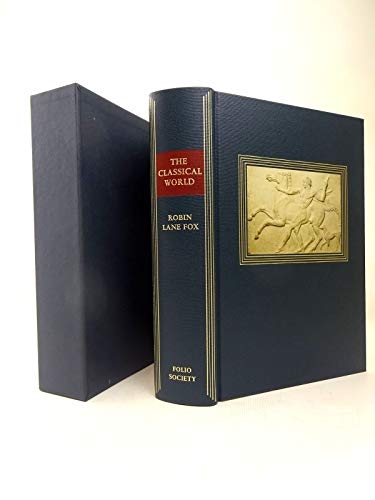The Classical World - Hardcover

"synopsis" may belong to another edition of this title.
In reality, the parallels are rarely so neat, and all too often people twist the past to confirm their own preconceptions. The Nazis used the writings of Roman authors such as Tacitus to bolster their ideological claims about the inherent moral and martial superiority of the German race. That was an extreme case -- at one point, Himmler even tried to seize the oldest manuscript of one of Tacitus's books -- but even today, commentators with different political backgrounds will often draw radically opposing conclusions from the same episode in Greek or Roman history.
We need to understand the past on its own terms before trying to draw any lessons from it, and for this and other reasons, Robin Lane Fox's splendid The Classical World is to be especially welcomed. Lane Fox, who teaches at Oxford, is that rarest of writers: a distinguished academic who is willing and able to address a general audience. This latest book presents a survey of Greek and Roman culture over some 900 years, beginning with the era of Homer and ending with the rule of the Roman Emperor Hadrian. It is not a narrative history -- events such as the Peloponnesian War or Alexander the Great's campaigns are skimmed over -- but the discussion has a chronological framework, ensuring that we are not presented with a simplistic view of unchanging attitudes and beliefs.
This is a big book, but the subject is truly vast. In spite of this scope, the book's pace never slackens, and it remains readable throughout. Lane Fox makes no attempt to hide the vast gaps in our knowledge; phrases like "in my opinion" occur frequently, warning the reader that other interpretations are possible, even if there is no time to discuss them.
Evidence or lack thereof dictates what we can say about the ancient world, of course. Important figures such as the Athenian statesman Pericles remain quite shadowy, and it is very hard to gain a sense of what the great man was like. Not until the entry of King Philip II of Macedon and his son, Alexander the Great, do key characters in the story register more as human beings, although the sheer scale and speed of the latter's achievements will always make him something of an enigma. This changes when we come to the centuries of Roman dominance, when the reader gets far more vivid impressions of men like Pompey and Caesar, Cicero and Pliny, Augustus and Hadrian. This is simply a reflection of the sources Lane Fox has to work with, for biographies and even private letters survive from many of these men (it is invariably a question of men since even the most influential women of the imperial court remain vaguely known figures).
Although the scope of The Classical World is broad, it deals primarily with the lives and attitudes of the wealthy elite. We know relatively little about the less well off, even in democratic Athens, and we know almost nothing about the poorer inhabitants of other Greek cities. So we do not get much sense of the lives of the majority of the population, although this would be a little more feasible in the Roman era. Three main themes of The Classical World -- justice, liberty and luxury -- are each shaped by the perspective of the upper class. For instance, Roman justice was never supposed to be blind but to take full and favorable account of a person's wealth and status. Or consider another recurring topic, the importance of horses and hunting. Few academics mention such things other than in passing, but Lane Fox -- himself an experienced equestrian and hunter -- justifiably stresses these quintessentially aristocratic concerns.
Lane Fox's survey deserves to be widely read. Indeed, I cannot think of a better introduction to the subject for those with no prior knowledge. Whether or not you agree with all his interpretations -- and many will not -- no one will doubt that these are the considered opinions of someone with a deep knowledge of the subject. (Personally, I am unconvinced that the Roman Republic "could, indeed should, have survived" Julius Caesar after he had become dictator, or that it would have survived had Mark Antony been assassinated along with Caesar.) Still, Lane Fox's strong and clear narrative will stimulate those reacquainting themselves with this fascinating era as much as it enthralls newcomers.
Reviewed by Adrian Goldsworthy
Copyright 2006, The Washington Post. All Rights Reserved.
"About this title" may belong to another edition of this title.
- PublisherFolio Society
- ISBN 10 1405302623
- ISBN 13 9781405302623
- BindingHardcover
- Rating
(No Available Copies)
Search Books: Create a WantIf you know the book but cannot find it on AbeBooks, we can automatically search for it on your behalf as new inventory is added. If it is added to AbeBooks by one of our member booksellers, we will notify you!
Create a Want
